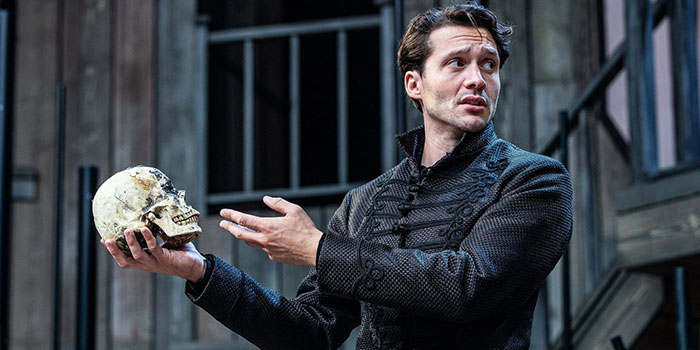Hamlet’s first soliloquy in Act 1, Scene 2, lines 133-164 is a passionate and startling passage that strongly contrasts to the artificial dialogue and actions that he portrays to his uncle Claudius throughout the remainder of the play. This soliloquy serves to reveal Hamlet’s melancholia and the reasons for his despair in an outpouring of anger, disgust, sorrow, and grief through which he explains how everything in his life seems futile and miserable.
He mourns the death of his father, is sickened by his mother’s marriage to his uncle, and also feels extremely miserable about the entire situation with regards to the value of his own life. Hamlet is so grieved by his father’s death that he too wishes to die. He feels as if he is a defiled person stating that
O, that this too, too sullied flesh would melt, Thaw, and resolve itself into dew” (I. ii. 133-134).
He seems to hope that if he was to die, then he would become cleansed and pure as the dew cleanses the earth at the dawn of day.
He wants to break out of the captivity of his flesh as a “spiritual release” of sorts. Shakespeare juxtaposes this notion with the term “Everlasting” (I. ii. 135) making his body possess a state of permanence something that is everlasting compared to breaking down into the dew that he wishes to become. Hamlet also realizes that committing suicide would be considered a sin in the eyes of the “Everlasting” God (I. ii. 135) who with his “canon ‘gainst (self slaughter! )” (I. ii. 136) would prevent him from reaching heaven.
Shakespeare also uses metaphors for Gertrude, by stating that she is “an unweeded garden That grows to seed.” (I. ii. 139). This can be seen in many ways, one of which is the possibility that Hamlet is portraying his mother as a sort of Virgin Mary who was sexually untouched and unviolated like an unbreached garden prior to her “fall. ” This would make Claudius into a Satan-like figure who breaches the garden with his bed “stewed in corruption” (III. iv. 93) and she loses her purity and grows to seed.
Saddened not only by his father’s death, Hamlet is also outraged about the quick marriage between Gertrude and Claudius. Hamlet retracts Gertrude’s initial grief at the loss of her husband saying that she cried “unrighteous tears” (I. ii. 159) and he is tormented by images of his mother’s affection towards his father, believing that her display of love was a pretense to satisfy her own lust and greed. He feels that she acted too hastily and states
O God, a beast that wants discourse of reason Would have mourned longer! ” (I. ii. 54-155)
He is obviously against the marriage and believes that
She married. O, most wicked speed, to post With such dexterity to incestuous sheets! (I. ii161-162).
To Hamlet, Claudius is nothing compared to his deceased father. “So excellent a king, that was to this Hyperion to a satyr” (I. ii. 143-144) is a wonderful juxtaposition used by Shakespeare to compare Old Hamlet with Claudius. The allusion of Hyperion, the Titan God of Light, represents honor, virtue, and regality which are all traits that were common to Hamlet’s father.
Satyrs, which are half-human, half-beast creatures of the Wine-God Dionysus, represent lewdness and overindulgence much like the traits of Claudius. A final important contrast is seen in Hamlet’s self-depreciating comment “but no more like my father than I to Hercules” (I. ii. 157-158). This remark notes Hamlet’s continuing disgust and disapproval of Claudius, stating that he is no closer to the Old King Hamlet than he himself is to Hercules.
Overall, this soliloquy is packed full of deep meanings and carefully executed literary elements that make it a very powerful passage which helps the readers get into Hamlet’s head for the first time to see what his true thoughts are. Shakespeare uses many different literary elements throughout this passage which I have given examples of the tone of this passage is a very serious and personal one since it is Hamlet’s first soliloquy of the play. He speaks to himself seemingly to justify his feelings and to allow the readers to understand what it is running through his head.
A lot of strong specific imagery is used in order to create a serious and convincing mood on par with that of which Hamlet is feeling. Much of the imagery is dark, “rank”, and “gross” (I. ii. 140) which help create the somber mood that Hamlet is in. He uses an awful lot of juxtaposition, similes, and metaphors to make it obviously clear the point he is trying to get across. Shakespeare seems to use these comparisons in a fashion to make the difference between the two objects as blatant as possible, as evidenced by the Hyperion/satyr comparison.
Allusions are also used heavily throughout in order to give his ideas more backing and support, especially referring to past mythology with Hyperion, Hercules, and the satyrs. The overall tone of this soliloquy is a very personal and emotional one since it is really the first time that Hamlet has revealed his inner thoughts so openly. It accomplishes its objective of revealing the deep thoughts of Hamlet and his inner struggle with amazing proficiency, and helps the reader to understand the basis for his actions throughout the rest of the play.

